英语综合4翻译
大学英语综合教程4课文翻译
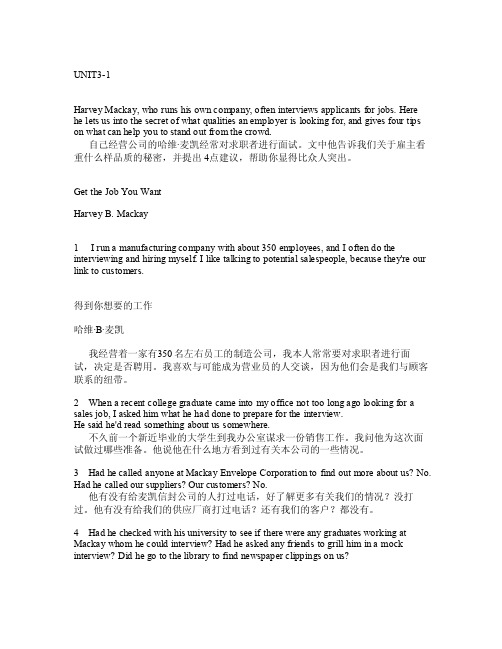
UNIT3-1Harv ey Ma ckay, whorunshis o wn co mpany, oft en in tervi ews a pplic antsfor j obs.Herehe le ts us into thesecre t ofwhatquali tiesan em ploye r islooki ng fo r, an d giv es fo ur ti ps on what canhelpyou t o sta nd ou t fro m the crow d.自己经营公司的哈维·麦凯经常对求职者进行面试。
文中他告诉我们关于雇主看重什么样品质的秘密,并提出4点建议,帮助你显得比众人突出。
Getthe J ob Yo u Wan tH arvey B. M ackay1I run a ma nufac turin g com panywithabout 350emplo yees, andI oft en do theinter viewi ng an d hir ing m yself. I l ike t alkin g topoten tialsales peopl e, be cause they're o ur li nk to cust omers.得到你想要的工作哈维·B·麦凯我经营着一家有350名左右员工的制造公司,我本人常常要对求职者进行面试,决定是否聘用。
我喜欢与可能成为营业员的人交谈,因为他们会是我们与顾客联系的纽带。
2W hen a rece nt co llege grad uatecameintomy of ficenot t oo lo ng ag o loo kingfor asale s job, I a skedhim w hat h e had done to p repar e for theinter view.He s aid h e'd r ead s ometh ing a boutus so mewhe re. 不久前一个新近毕业的大学生到我办公室谋求一份销售工作。
大学综合英语4课后翻译中英对照

大学综合英语4课后翻译中英对照1. 我安排他们在小酒吧见面,但那个小伙子一直都没有来。
(turn up)I had arranged for them to meet each other at the pub, but the young man never turned up.2. 你无法仅凭表象判断形势是否会变得对我们不利。
(tell from appearance)You cannot tell merely from appearances whether things will turn out unfavourable to us or not.3. 那个士兵每次打仗都冲锋在前,从而赢得了国家的最高荣誉。
(stand in the gap)The soldier, who stood in the gap in every battle, gained the highest honors of the country.4. 主席讲话很有说服力,委员会其他成员都听从他的意见。
(yield to)The chairman spoke so forcefully that the rest of the committee yielded to his opinion.5. 他们现在生活富裕了,但也曾经历坎坷。
(ups and downs)They are well-to-do now, but along the way they had their ups and downs.6. 这次演讲我将说明两个问题。
(address oneself to)There are two questions to which I will address myself in this lecture.7. 我们正筹划为你举办一次盛大的圣诞聚会。
(in sb.’s honour)We are planning a big Christmas party in your honour.8. 听到那个曲子,我回想起了儿童时代。
全新版大学英语综合教程4课文原文及翻译

全新版大学英语综合教程4课文原文及翻译《全新版大学英语综合教程 4 课文原文及翻译》在大学英语的学习过程中,全新版大学英语综合教程 4 无疑是一本重要的教材。
其中的课文涵盖了丰富多样的主题和文体,对于提升英语语言能力和拓宽知识面都具有重要意义。
下面将为您呈现部分课文的原文及翻译。
课文一:The Tail of FameAn artist who seeks fame is like a dog chasing his own tail who, when he captures it, does not know what else to do but to continue chasing it The cruelty of success is that it often leads those who seek such success to participate in their own destruction"Don't quit your day job!" is advice frequently given by understandably pessimistic family members and friends to a budding artist who is trying hard to succeed The conquest of fame is difficult at best, and many end up emotionally if not financially bankrupt Still, impure motives such as the desire for worshipping fans and praise from peers may spur the artist on The lure of drowning in fame's imperial glory is not easily resisted Those who gain fame most often gain it as a result of exploiting their talent for singing, dancing, painting, or writing, etc They develop a style that agents market aggressively to hasten popularity, and their ride on the express elevator to the top is a blur Most would be hardpressed to tell you how theyeven got there Artists cannot remain idle, though When the performer, painter or writer becomes bored, their work begins to show a lack of continuity in its appeal and it becomes difficult to sustain the attention of the public After their enthusiasm has dissolved, the public simply moves on to the next flavor of the month Artists who do attempt to remain current by making even minute changes to their style of writing, dancing or singing,run a significant risk of losing the audience's favor The public simply discounts styles other than those for which the artist has become famousFamous authors' styles—such as Jane Austen's or Ernest Hemingway's—are easily recognizable The same is true of painters like Monet or Picasso The distinctive style of an artist, however, can become a trademark Whenthat happens, the artist becomes confined to that style If an artist is talented but not unique, fame will be fleeting Even if an artist possesses a unique style, fame is not guaranteed The market for art is fickle The public's appetite for a new style is insatiable The artist, like the politician, must often please the public in order to remain popular翻译:名声之尾追求名声的艺术家就像一只追着自己尾巴跑的狗,一旦抓住了尾巴,除了继续追着跑之外,不知道还能做什么。
全新版大学英语综合教程4课文原文及翻译
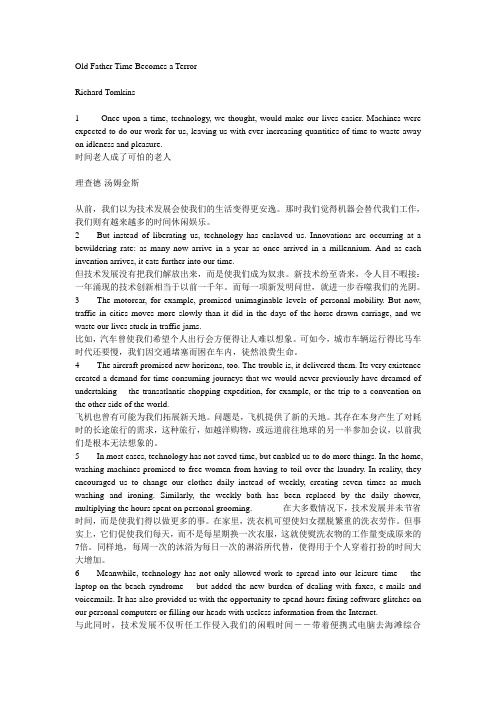
Old Father Time Becomes a TerrorRichard Tomkins1 Once upon a time, technology, we thought, would make our lives easier. Machines were expected to do our work for us, leaving us with ever-increasing quantities of time to waste away on idleness and pleasure.时间老人成了可怕的老人理查德·汤姆金斯从前,我们以为技术发展会使我们的生活变得更安逸。
那时我们觉得机器会替代我们工作,我们则有越来越多的时间休闲娱乐。
2 But instead of liberating us, technology has enslaved us. Innovations are occurring at a bewildering rate: as many now arrive in a year as once arrived in a millennium. And as each invention arrives, it eats further into our time.但技术发展没有把我们解放出来,而是使我们成为奴隶。
新技术纷至沓来,令人目不暇接:一年涌现的技术创新相当于以前一千年。
而每一项新发明问世,就进一步吞噬我们的光阴。
3 The motorcar, for example, promised unimaginable levels of personal mobility. But now, traffic in cities moves more slowly than it did in the days of the horse-drawn carriage, and we waste our lives stuck in traffic jams.比如,汽车曾使我们希望个人出行会方便得让人难以想象。
全新版大学英语综合教程4课后翻译(完整版)
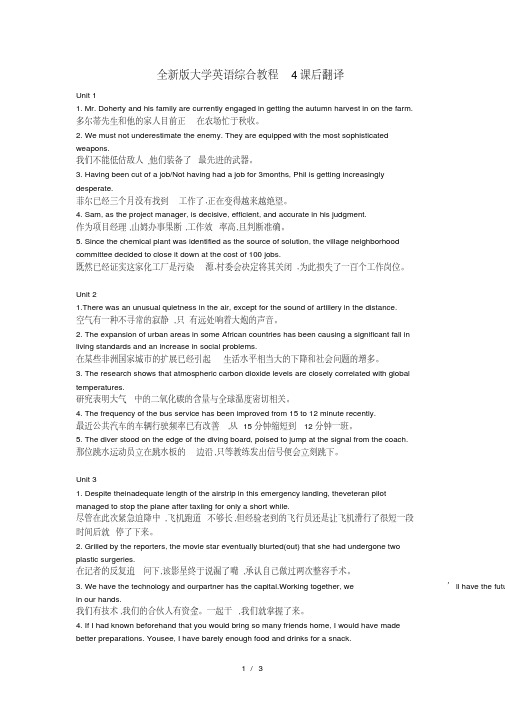
全新版大学英语综合教程4课后翻译Unit 11. Mr. Doherty and his family are currently engaged in getting the autumn harvest in on the farm.多尔蒂先生和他的家人目前正在农场忙于秋收。
2. We must not underestimate the enemy. They are equipped with the most sophisticatedweapons.我们不能低估敌人,他们装备了最先进的武器。
3. Having been cut of a job/Not having had a job for 3months, Phil is getting increasinglydesperate.菲尔已经三个月没有找到工作了,正在变得越来越绝望。
4. Sam, as the project manager, is decisive, efficient, and accurate in his judgment.作为项目经理,山姆办事果断,工作效率高,且判断准确。
5. Since the chemical plant was identified as the source of solution, the village neighborhoodcommittee decided to close it down at the cost of 100 jobs.既然已经证实这家化工厂是污染源,村委会决定将其关闭,为此损失了一百个工作岗位。
Unit 21.There was an unusual quietness in the air, except for the sound of artillery in the distance.空气有一种不寻常的寂静,只有远处响着大炮的声音。
2. The expansion of urban areas in some African countries has been causing a significant fall inliving standards and an increase in social problems.在某些非洲国家城市的扩展已经引起生活水平相当大的下降和社会问题的增多。
全新版大学英语综合教程4Vocabulary翻译
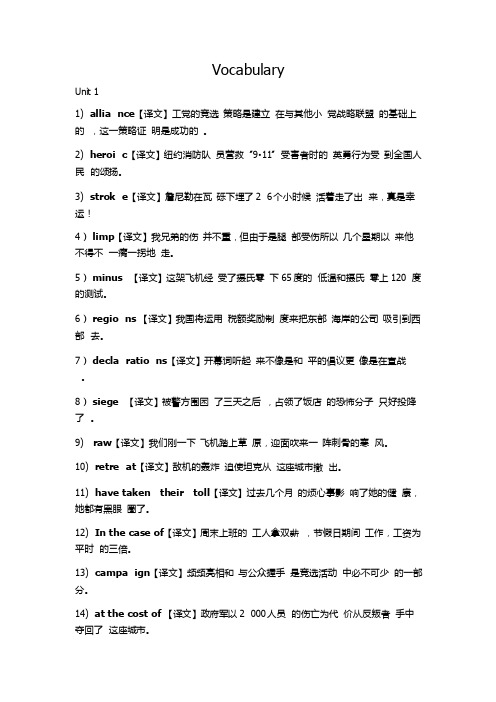
Vocabu laryUnit 11) alliance【译文】工党的竞选策略是建立在与其他小党战略联盟的基础上的,这一策略证明是成功的。
2) heroic【译文】纽约消防队员营救“9•11”受害者时的英勇行为受到全国人民的颂扬。
3) stroke【译文】詹尼勒在瓦砾下埋了26个小时候活着走了出来,真是幸运!4)limp【译文】我兄弟的伤并不重,但由于是腿部受伤所以几个星期以来他不得不一瘸一拐地走。
5)minus【译文】这架飞机经受了摄氏零下65度的低温和摄氏零上120度的测试。
6)regions【译文】我国将运用税额奖励制度来把东部海岸的公司吸引到西部去。
7)declarations【译文】开幕词听起来不像是和平的倡议更像是在宣战。
8)siege【译文】被警方围困了三天之后,占领了饭店的恐怖分子只好投降了。
9) raw【译文】我们刚一下飞机踏上草原,迎面吹来一阵刺骨的寒风。
10) retreat【译文】敌机的轰炸迫使坦克从这座城市撤出。
11) have taken their toll【译文】过去几个月的烦心事影响了她的健康,她都有黑眼圈了。
12) In the case of【译文】周末上班的工人拿双薪,节假日期间工作,工资为平时的三倍。
13) campaign【译文】频频亮相和与公众握手是竞选活动中必不可少的一部分。
14) at the cost of 【译文】政府军以2000人员的伤亡为代价从反叛者手中夺回了这座城市。
15) has been brought to a halt【译文】由于码头工人罢工,原材料不能按时运到,许多工厂的生产被迫停止。
Unit 21) expansion【译文】在英裔美国人向西扩张之前,北美已经受到其他众多文化的影响。
大学英语综合教程4课后词组答案及翻译
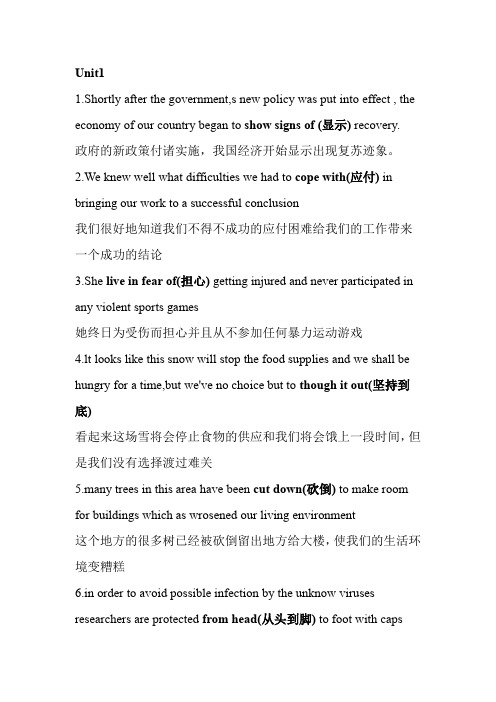
Unit11.Shortly after the government,s new policy was put into effect,the economy of our country began to show signs of(显示) recovery.政府的新政策付诸实施,我国经济开始显示出现复苏迹象。
2.We knew well what difficulties we had to cope with(应付) in bringing our work to a successful conclusion我们很好地知道我们不得不成功的应付困难给我们的工作带来一个成功的结论3.She live in fear of(担心) getting injured and never participated in any violent sports games她终日为受伤而担心并且从不参加任何暴力运动游戏4.lt looks like this snow will stop the food supplies and we shall be hungry for a time,but we've no choice but to though it out(坚持到底)看起来这场雪将会停止食物的供应和我们将会饿上一段时间,但是我们没有选择渡过难关5.many trees in this area have been cut down(砍倒) to make room for buildings which as wrosened our living environment这个地方的很多树已经被砍倒留出地方给大楼,使我们的生活环境变糟糕6.in order to avoid possible infection by the unknow viruses researchers are protected from head(从头到脚) to foot with capsface masks and white gowns为了避免被不知道的病毒的可能感染,研究员们被从头到脚的用帽子、面罩和白袍保护7.despite the warm weather the explorers searched out(找到) some snow on the northen slope and boiled it for drinking water尽管天气暖和,这些探险家们在北坡上找到一些雪和煮沸它得到饮用水8.starting bare-handed you have built up so many steel plants,this is nothing short of(白手起家) miraculous开始于白手起家,你建立那么多钢铁场。
综合英语4 Unit9-Unit14 课文课后翻译
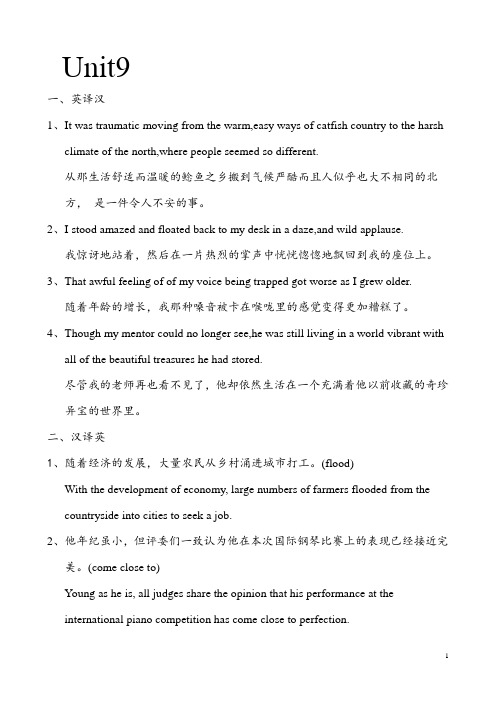
Unit9一、英译汉1、It was traumatic moving from the warm,easy ways of catfish country to the harshclimate of the north,where people seemed so different.从那生活舒适而温暖的鲶鱼之乡搬到气候严酷而且人似乎也大不相同的北方,是一件令人不安的事。
2、I stood amazed and floated back to my desk in a daze,and wild applause.我惊讶地站着,然后在一片热烈的掌声中恍恍惚惚地飘回到我的座位上。
3、That awful feeling of of my voice being trapped got worse as I grew older.随着年龄的增长,我那种嗓音被卡在喉咙里的感觉变得更加糟糕了。
4、Though my mentor could no longer see,he was still living in a world vibrant withall of the beautiful treasures he had stored.尽管我的老师再也看不见了,他却依然生活在一个充满着他以前收藏的奇珍异宝的世界里。
二、汉译英1、随着经济的发展,大量农民从乡村涌进城市打工。
(flood)With the development of economy, large numbers of farmers flooded from the countryside into cities to seek a job.2、他年纪虽小,但评委们一致认为他在本次国际钢琴比赛上的表现已经接近完美。
(come close to)Young as he is, all judges share the opinion that his performance at theinternational piano competition has come close to perfection.3、也许是因为喝了烈性酒的关系,她在去伦敦的路上一直恍恍惚惚的。
全新版大学英语第二版综合教程4课文原文及翻译

They say that pride comes before a fall. In the case of both Napoleon and Hitler, the many victories they enjoyed led them to believe that anything was possible, that nothing could stand in their way. Russia's icy defender was to prove them wrong.人道是骄兵必败。
就拿拿破仑和希特勒两人来说吧,他们所向披靡,便以为自己战无不胜,不可阻挡。
但俄罗斯的冰雪卫士证明他们错了。
The Icy DefenderNila B. Smith1 In 1812, Napoleon Bonaparte, Emperor of the French, led his Grand Army into Russia. He was prepared for the fierce resistance of the Russian people defending their homeland. He was prepared for the long march across Russian soil to Moscow, the capital city. But he was not prepared for the devastating enemy that met him in Moscow -- the raw, bitter, bleak Russian winter.冰雪卫士奈拉·B·史密斯1812年,法国皇帝拿破仑·波拿巴率大军入侵俄罗斯。
他准备好俄罗斯人民会为保卫祖国而奋勇抵抗。
他准备好在俄罗斯广袤的国土上要经过长途跋涉才能进军首都莫斯科。
大学英语综合教程第四册课后翻译及答案
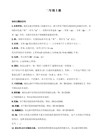
1.) Due to his pessimistic outlook on the European economy, John has moved his assets from Europe to elsewhere.
我喜欢雇佣年经人。他们愿意学习,而且忠于职守。
2) I like hiring young people. They are earnest learners and committed to work.
玛丽和她那些以自己孩子为中心的女友们不同,更在意个人成长。
3) Unlike her girl friends who center their lives on their children, Mary cares more about her personal growth.
我的直觉是亨利会设法参加这次探险,因此他有一点冒险家的气质。
1). I have an instinct that Henry will seek to join the expedition, because he is something of an adventurer.
即使置身于一个嘈杂的环境中,他也能坚持做手头的工作。
多尔蒂先生和他的家人目前正在农场忙于秋收。
1) Mr. Doherty and his family are currently engaged in getting the autumn harvest in on the farm.
我们不能低估敌人,他们装备了最先进的武器。
2) We must not underestimate the enemy.They are equipped with the most sophisticated weapons.
新标准大学英语综合教程4课后翻译U1--U8
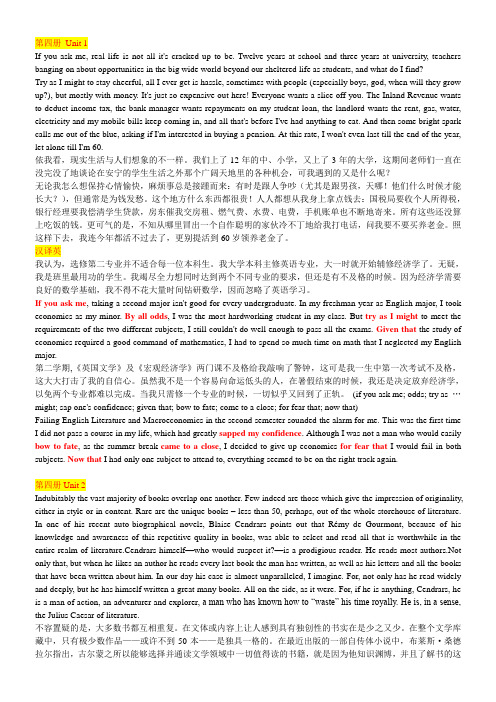
第四册Unit 1If you ask me, real life is not all it's cracked up to be. Twelve years at school and three years at university, teachers banging on about opportunities in the big wide world beyond our sheltered life as students, and what do I find?Try as I might to stay cheerful, all I ever get is hassle, sometimes with people (especially boys, god, when will they grow up?), but mostly with money. It's just so expensive out here! Everyone wants a slice off you. The Inland Revenue wants to deduct income tax, the bank manager wants repayments on my student loan, the landlord wants the rent, gas, water, electricity and my mobile bills keep coming in, and all that's before I've had anything to eat. And then some bright spark calls me out of the blue, asking if I'm interested in buying a pension. At this rate, I won't even last till the end of the year, let alone till I'm 60.依我看,现实生活与人们想象的不一样。
全新版大学英语综合教程4课文原文及翻译
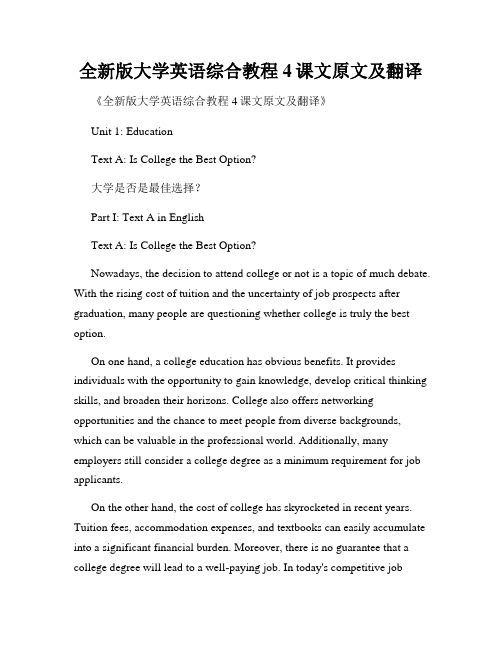
全新版大学英语综合教程4课文原文及翻译《全新版大学英语综合教程4课文原文及翻译》Unit 1: EducationText A: Is College the Best Option?大学是否是最佳选择?Part I: Text A in EnglishText A: Is College the Best Option?Nowadays, the decision to attend college or not is a topic of much debate. With the rising cost of tuition and the uncertainty of job prospects after graduation, many people are questioning whether college is truly the best option.On one hand, a college education has obvious benefits. It provides individuals with the opportunity to gain knowledge, develop critical thinking skills, and broaden their horizons. College also offers networking opportunities and the chance to meet people from diverse backgrounds, which can be valuable in the professional world. Additionally, many employers still consider a college degree as a minimum requirement for job applicants.On the other hand, the cost of college has skyrocketed in recent years. Tuition fees, accommodation expenses, and textbooks can easily accumulate into a significant financial burden. Moreover, there is no guarantee that a college degree will lead to a well-paying job. In today's competitive jobmarket, having a degree no longer guarantees a successful career. Many college graduates find themselves underemployed or in jobs that don't align with their educational background.Furthermore, alternative pathways such as vocational schools, apprenticeships, or entrepreneurship have proven to be successful for many individuals. These options often provide practical, hands-on training and immediate job placement. For those who have a clear career goal and are willing to put in the effort, skipping college and pursuing alternative paths can lead to quicker entry into the workforce and potential financial success.In conclusion, the decision to attend college or pursue alternative paths depends on individual circumstances and goals. While a college education offers numerous benefits, it is necessary to carefully consider the financial costs and job prospects in today's economy. Ultimately, success in any field requires a combination of education, skills, and determination, regardless of whether one obtains a college degree or not.Part II: Text A in Chinese (课文A:大学是否是最佳选择?)如今,是否上大学成为了一个备受争议的话题。
全新版大学英语综合教程4课文句子课后翻译.

全新版大学英语综合教程四Unit1-5精选课文句子英翻中UNIT1 Mr. Doherty Builds His Dream Life多尔蒂先生创建自己的理想生活 1.And after years of frustration with city and suburban living, my wife Sandy and I have finally found contentment here in the country.在城市以及郊区历经多年的怅惘失望之后,我和妻子桑迪终于在这里的乡村寻觅到心灵的满足。
2.In the summer we canoe on the river, go picnicking in the woods and take long bicyclerides. In the winter we ski and skate.日里我们在河上荡舟,在林子里野餐,骑着自行车长时间漫游。
冬日里我们滑雪溜冰。
3.Three months from now, it will be 95 above and we will be cultivating corn, weedingstrawberries and killing chickens.再过三个月,气温会升到95度,我们就要给玉米松土,在草莓地除草,还要ter this month, we'll spray the orchard, paint the barn, plant the garden and clean thehen house before the new chicks arrive.这个月晚些时候,我们要给果树喷洒药水,要油漆谷仓,要给菜园播种,要赶在新的小鸡运到之前清扫鸡舍。
5.In between such chores, I manage to spend 50 to 60 hours a week at the typewriter ordoing reporting for the freelance articles I sell to magazines and newspapers.在这些活计之间,我每周要抽空花五、六十个小时,不是打字撰文,就是为作为自由撰稿人投给报刊的文章进行采访。
全新版大学英语综合教程4课文参考译文
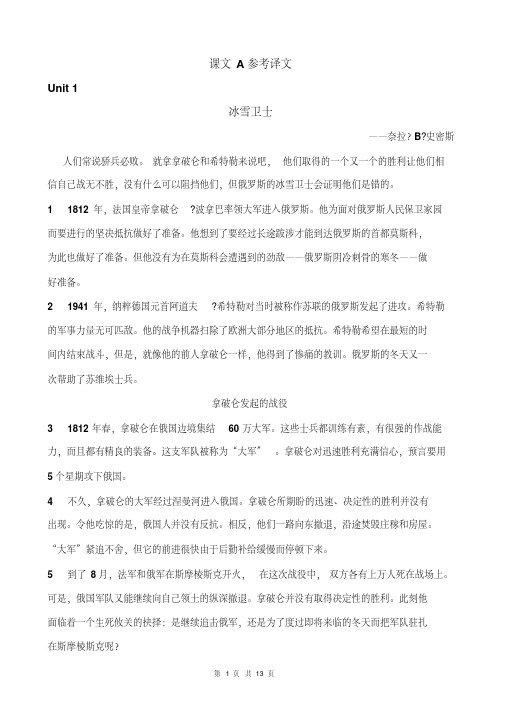
课文A参考译文Unit 1冰雪卫士——奈拉?B?史密斯人们常说骄兵必败。
就拿拿破仑和希特勒来说吧,他们取得的一个又一个的胜利让他们相信自己战无不胜,没有什么可以阻挡他们,但俄罗斯的冰雪卫士会证明他们是错的。
1 1812年,法国皇帝拿破仑?波拿巴率领大军进入俄罗斯。
他为面对俄罗斯人民保卫家园而要进行的坚决抵抗做好了准备。
他想到了要经过长途跋涉才能到达俄罗斯的首都莫斯科,为此也做好了准备。
但他没有为在莫斯科会遭遇到的劲敌——俄罗斯阴冷刺骨的寒冬——做好准备。
2 1941年,纳粹德国元首阿道夫?希特勒对当时被称作苏联的俄罗斯发起了进攻。
希特勒的军事力量无可匹敌。
他的战争机器扫除了欧洲大部分地区的抵抗。
希特勒希望在最短的时间内结束战斗,但是,就像他的前人拿破仑一样,他得到了惨痛的教训。
俄罗斯的冬天又一次帮助了苏维埃士兵。
拿破仑发起的战役3 1812年春,拿破仑在俄国边境集结60万大军。
这些士兵都训练有素,有很强的作战能力,而且都有精良的装备。
这支军队被称为“大军”。
拿破仑对迅速胜利充满信心,预言要用5个星期攻下俄国。
4 不久,拿破仑的大军经过涅曼河进入俄国。
拿破仑所期盼的迅速、决定性的胜利并没有出现。
令他吃惊的是,俄国人并没有反抗。
相反,他们一路向东撤退,沿途焚毁庄稼和房屋。
“大军”紧追不舍,但它的前进很快由于后勤补给缓慢而停顿下来。
5 到了8月,法军和俄军在斯摩棱斯克开火,在这次战役中,双方各有上万人死在战场上。
可是,俄国军队又能继续向自己领土的纵深撤退。
拿破仑并没有取得决定性的胜利。
此刻他面临着一个生死攸关的抉择:是继续追击俄军,还是为了度过即将来临的冬天而把军队驻扎在斯摩棱斯克呢?6 拿破仑决定冒险向远在448公里之外的莫斯科进发。
1812年9月7日,法俄两军在鲍罗季诺展开激烈的战斗,此地在莫斯科以西112公里外。
夜幕降临时,法军和俄军分别有3万和4.4万名士兵的死伤。
7 俄国军队再次撤退到安全的地方。
综合教程大学英语4课本译文及课后答案

综合教程⼤学英语4课本译⽂及课后答案《⼤学英语4 》复习⾃整理2017年6⽉20⽇柏映⽻版权所有,请勿翻印第⼀单元MAN AND NATURE⼀.TEXTA(P4-7)课⽂翻译:⼈在⾃然界亚历⼭⼤?斯伯⾦1 ⼈类⽣活在⼤⾃然的王国⾥。
他们时刻被⼤⾃然所包围并与之相互影响。
⼈类呼吸的空⽓、喝下的⽔和摄⼊的⾷物,⽆⼀不令⼈类时刻感知到⼤⾃然的影响。
我们与⼤⾃然⾎⾁相连,离开⼤⾃然,我们将⽆法⽣存。
2 ⼈类不仅⽣活在⼤⾃然之中,同时也在改变着⼤⾃然。
⼈类把⾃然资源转变为各种⽂化、社会历史的财富。
⼈类降服并控制了电,迫使它为⼈类社会的利益服务。
⼈类不仅把各种各样的动植物转移到不同的⽓候环境下,也改变了他所⽣活环境的地貌和⽓候,并使动植物因之⽽发⽣转变。
3 随着社会的发展,⼈类对⼤⾃然的直接依赖越来越少,⽽间接的依赖却越来越多。
我们远古的祖先⽣活在⼤⾃然的威胁及破坏⼒的恐惧之中,他们常常连基本的⽣活物资都⽆法获取。
然⽽,尽管⼯具不甚完备,他们却能同⼼协⼒,顽强⼯作,并总是有所收获。
在与⼈类的相互作⽤中,⼤⾃然也发⽣了改变。
森林被破坏了,耕地⾯积增加了。
⼤⾃然及其威⼒被看成是和⼈类敌对的东西。
譬如,森林被认为是野性的和令⼈恐惧的,因此⼈类便想⽅设法使其⾯积缩⼩。
这⼀切都是打着“⽂明”的旗号进⾏的,所谓“⽂明”,就是指⼈类在那些地⽅建⽴了家园,那些地⽅的⼟地得以耕耘,那⾥的森林已被砍伐。
4 然⽽,随着岁⽉的流逝,⼈类越来越关注的是在何处以及如何得到⽣产所需的不可替代的⾃然资源的问题。
科学与⼈类改变⼤⾃然的实践活动已经使⼈类意识到了⼯业在改变地球的进程中对地质产⽣的重⼤影响。
5 ⽬前,⼈与⾃然以及⾃然与社会整体之间过去存在的动态平衡,已呈现崩溃的迹象。
⽣物圈中所谓可替代资源的问题变得极为严重。
⼈类和社会的需求,即便是像淡⽔⼀样的物质,也变得越来越难以满⾜。
清除⼯业废物的问题也变得⽇益复杂。
6 现代技术的特征是⽣产和使⽤⽇益丰富的⼈⼯合成产品。
全新版大学英语综合教程4课文原文及翻译
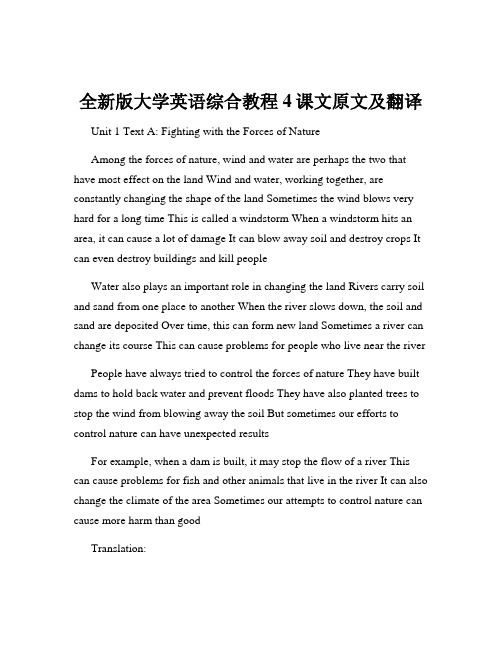
全新版大学英语综合教程4课文原文及翻译Unit 1 Text A: Fighting with the Forces of NatureAmong the forces of nature, wind and water are perhaps the two that have most effect on the land Wind and water, working together, are constantly changing the shape of the land Sometimes the wind blows very hard for a long time This is called a windstorm When a windstorm hits an area, it can cause a lot of damage It can blow away soil and destroy crops It can even destroy buildings and kill peopleWater also plays an important role in changing the land Rivers carry soil and sand from one place to another When the river slows down, the soil and sand are deposited Over time, this can form new land Sometimes a river can change its course This can cause problems for people who live near the riverPeople have always tried to control the forces of nature They have built dams to hold back water and prevent floods They have also planted trees to stop the wind from blowing away the soil But sometimes our efforts to control nature can have unexpected resultsFor example, when a dam is built, it may stop the flow of a river This can cause problems for fish and other animals that live in the river It can also change the climate of the area Sometimes our attempts to control nature can cause more harm than goodTranslation:在自然力量中,风和水也许是对陆地影响最大的两种力量。
新标准大学英语综合教程4课文翻译

新标准大学英语综合教程4课文翻译Unit 1 Friendship。
Part I。
Text A。
Friendship。
Friendship is an important part of life. Everyone needs friends. No one can live without friends. If we have friends, we are happy. If we have no friends, we feel lonely. Friendship is a kind of love. It is a feeling between people who care about each other. Friendship is a wonderful thing. It makes our lives interesting and happy.Some people have many friends. Others have only a few friends. Some people have friends at work. Others have friends at school. Some people make friends easily. Others find it hard to make friends. Some people have friends from childhood. Others make friends when they are adults.How do we make friends? Making friends is not difficult. We can make friends by being friendly to others. We can make friends by helping others. We can make friends by talking to others. We can make friends by sharing our things with others. We can make friends by spending time with others. We can make friends by being ourselves.Friendship is like a plant. It needs to be watered and cared for. We need to spend time with our friends. We need to listen to our friends. We need to help our friends. We need to be kind to our friends. We need to trust our friends. We need to forgive our friends.We all have friends. Some friends are close to us. Others are not so close. Some friends are old. Others are new. Some friends are easy to get along with. Others are not so easy. Some friends are always there for us. Others are not always there for us.We need to be a good friend. We need to be a good listener. We need to be a good helper. We need to be a good sharer. We need to be a good companion. We need to be a good forgiver.Friendship is important. It is important to have friends. It is important to be a good friend. Let's cherish our friends. Let's be good friends.Part II。
全新版大学英语综合教程4课文原文及翻译

全新版大学英语综合教程4课文原文及翻译Unit 1 Living and LearningText AWomen and TraditionIn the remote mountain villages of southwest China, it seems that time has stood still for centuries. The traditional way of life that has been passed down from generation to generation remains untouched by the modern world. Here, women are the family organizers, responsible for farming and family matters.Women plant and harvest crops, take care of livestock, cook for their families, and raise children. They are the pillars of their communities, responsible for preserving their cultural traditions. Despite the heavy workload, women in these villages take pride in their roles.Traditional gender roles in these communities paint a stark contrast to the modern world. However, as China rapidly develops, there is an evident shift happening. Young women are drifting away from their traditional roles, pursuing careers and education in larger cities. This shift has both positive and negative implications for these rural communities.On the one hand, women have more opportunities for personal growth and economic independence. By pursuing education and employment outside their villages, they can experience a different way of life and contribute to their families' financial stability. This newfound freedomallows women to break free from traditional constraints and explore their full potential.On the other hand, the departure of young women from these villages also means a loss of resources and skills. With fewer women available to handle the farming and household tasks, the burden falls heavily on the older generation. The young women who leave often find it hard to return due to the lack of job opportunities and limited access to modern amenities in their home villages.In conclusion, the traditional roles of women in remote Chinese villages are slowly changing as modernization takes over. While women now have more choices and freedom, this shift also brings challenges for the communities they leave behind. Balancing tradition and progress is a delicate task, and finding ways to preserve cultural heritage while embracing modernity is crucial.Unit 2 EducationText AA Day in the Life of a College StudentCollege life is an exciting and transformative period. As students pursue higher education, they experience a newfound sense of freedom and responsibility. Let's take a closer look at a typical day in the life of a college student.The day begins with the sound of the alarm clock buzzing. Time to wake up and start the day! After a quick shower and getting dressed, the studentheads to the cafeteria for breakfast. Fueling up with a hearty meal is essential to keep energy levels up throughout the day.Next, it's time for classes. The student attends various lectures, takes notes, and participates in discussions. The college curriculum covers a wide range of subjects, allowing students to explore their interests and discover new fields of study.After a morning of classes, it's time for a lunch break. The student grabs a quick bite to eat and maybe meets up with friends for some socializing. College is not just about academics but also about building lifelong friendships and connections.In the afternoon, the student might have some free time between classes. This is an opportunity to catch up on assignments, study, or engage in extracurricular activities. Many students join clubs or organizations to pursue their hobbies or develop leadership skills.As the day progresses, evening approaches. Some students have part-time jobs, while others use this time to relax or engage in recreational activities. It's important to find a balance between academics and personal well-being.Finally, it's time for dinner. Students gather at the dining hall or cook their own meals if they live off-campus. Sharing a meal with friends or roommates is a great way to unwind and recharge after a long day.After dinner, the student might have some more studying to do or attend a club meeting. However, it's essential to make time for rest and relaxation.Going to bed at a reasonable hour ensures that the student is well-rested for the next day's activities.In conclusion, a college student's day is a whirlwind of classes, socializing, and personal growth. Balancing academics with extracurricular activities and personal well-being is the key to a successful college experience. Embracing the opportunities presented during this time paves the way for a bright and promising future.这里提供3000字的两篇文章,分别是“Women and Tradition”和“A Day in the Life of a College Student”。
全新版大学英语综合教程(第二版)4课后翻译大全(句子 短文)
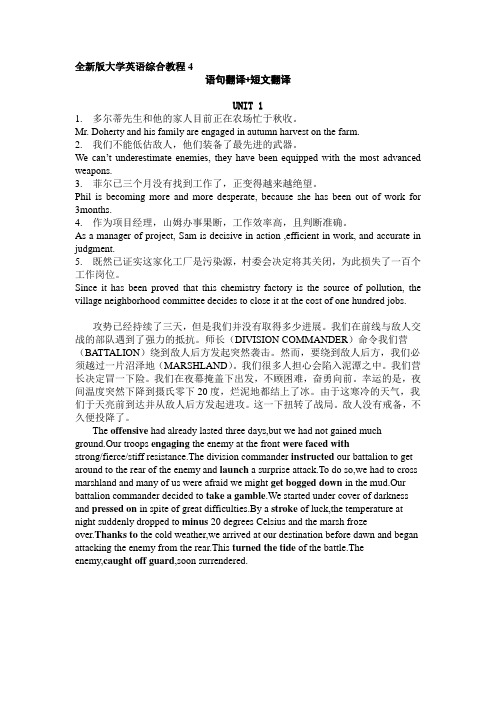
全新版大学英语综合教程4语句翻译+短文翻译UNIT 11. 多尔蒂先生和他的家人目前正在农场忙于秋收。
Mr. Doherty and his family are engaged in autumn harvest on the farm.2. 我们不能低估敌人,他们装备了最先进的武器。
We can’t underestimate enemies, they have been equipped with the most advanced weapons.3. 菲尔已三个月没有找到工作了,正变得越来越绝望。
Phil is becoming more and more desperate, because she has been out of work for 3months.4. 作为项目经理,山姆办事果断,工作效率高,且判断准确。
As a manager of project, Sam is decisive in action ,efficient in work, and accurate in judgment.5. 既然已证实这家化工厂是污染源,村委会决定将其关闭,为此损失了一百个工作岗位。
Since it has been proved that this chemistry factory is the source of pollution, the village neighborhood committee decides to close it at the cost of one hundred jobs.攻势已经持续了三天,但是我们并没有取得多少进展。
我们在前线与敌人交战的部队遇到了强力的抵抗。
师长(DIVISION COMMANDER)命令我们营(BATTALION)绕到敌人后方发起突然袭击。
然而,要绕到敌人后方,我们必须越过一片沼泽地(MARSHLAND)。
我们很多人担心会陷入泥潭之中。
新标准大学英语综合教程4课后翻译及课文翻译
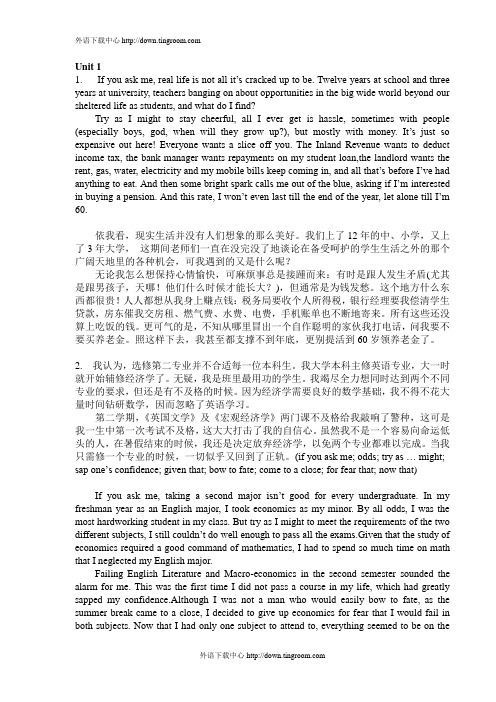
Unit 11. If you ask me, real life is not all it’s cracked up to be. Twelve years at school and three years at university, teachers banging on about opportunities in the big wide world beyond our sheltered life as students, and what do I find?Try as I might to stay cheerful, all I ever get is hassle, sometimes with people (especially boys, god, when will they grow up?), but mostly with money. It’s just so expensive out here! Everyone wants a slice off you. The Inland Revenue wants to deduct income tax, the bank manager wants repayments on my student loan,the landlord wants the rent, gas, water, electricity and my mobile bills keep coming in, and all that’s before I’ve had anything to eat. And then some bright spark calls me out of the blue, asking if I’m interested in buying a pension. And this rate, I won’t even last till the end of the year, let alone till I’m 60.依我看,现实生活并没有人们想象的那么美好。
- 1、下载文档前请自行甄别文档内容的完整性,平台不提供额外的编辑、内容补充、找答案等附加服务。
- 2、"仅部分预览"的文档,不可在线预览部分如存在完整性等问题,可反馈申请退款(可完整预览的文档不适用该条件!)。
- 3、如文档侵犯您的权益,请联系客服反馈,我们会尽快为您处理(人工客服工作时间:9:00-18:30)。
Unit 11 I live in a world of skinned knees, double-knotted shoelaces, riddles that I’ve heard a dozen times, stale birthday cakes, hurt feelings, wandering stories and one lost shoe (―and if you don’t find it my mother’ll kill me).我天天要面对的是:磕破了的膝盖、系成死扣的鞋带、已经听了十多遍的脑筋急转弯、发霉的生日蛋糕、受到伤害的情感、不知所以的故事、丢了的单只鞋子(“你要找不到它,妈妈会杀了我的。
” )。
2 I don’t have the singular power over language of a lawyer, the physical force of a construction worker, the command over fellow workers of a surgeon, the wheeling and dealing transactions of a businessman.我没有律师非凡的语言能力,没有建筑工人强大的体力,没有外科医生卓越的指挥能力,也没有商人的方法与手段。
3 A few years ago, when I was interviewing for an elementary-school teaching position, every principal told me with confidence that, as a male, I had an advantage over female applicants because of the lack of male teachers.几年前,当我面试一个小学教师职位的时候,每位校长都充满信心地对我说,作为男性我比女性求职者更有优势,因为他们缺少男教师。
4 Becoming a dean of students or a principal has never been one of my goals, but they seemed to expect me, as a male, to want to climb higher on the career stepladder.成为教务长或校长从来不是我的职业目标,但他们似乎希望我作为男性愿意在这个职业的阶梯上继续攀登。
5 Possibly, men would have more to say to me, and I to them, if my job had more of the trappings and benefits of more traditional male jobs.如果我的工作在福利待遇方面更像传统的男性工作的话,或许我和男士们之间的话会更多一些。
1 尽管我在那家公司有机会升职,我仍然选择了离开,去从事我热爱的工作。
(although + could have done; promotion)Although I could have got promotion in that company, I chose to leave and pursue the job I love.2. 你最先要遵从的不是你的老板,而是这个行业的规则。
(comply with)It is not your boss but the rules of the industry (that) you should first comply with.3. 一份好的简历是找到工作的第一步,因此今天我们提出讨论的是如何写份好简历。
(what-clause; bring up)A good résumé is the first step to getting a job. So what we bring up for discussion today is how to write a good résumé.4. 人们工作往往是为了谋生,而不是出于爱好。
(more often than not; for the sake of) People work, more often than not, for the sake of making a living rather than out of passion.5. 据面试官反馈,大部分接受面试的毕业生都说不出他们能为公司做些什么。
(feedback; contribute to)According to the interviewer’s feedback, most graduates couldn’t say what they can contribute to the company.Unit 31 No history of fashion in the years 1960 to 2010 can overlook or underestimate two constantfactors: jeans and the rise and fall of hemlines for women’s skirts and dresses.从1960年到2010年的任何一部时尚史都不能忽略或低估两个恒在的因素:牛仔裤和女性裙子长度的变化。
2 There is consensus among fashion editors that there is a precise relation, with only a few exceptions, between the length of women’s skirts and the economy.时尚编辑们一致认为:除了个别情况外,女性裙子的长度和经济之间有着密切的联系。
3 As the world economies bounced back again in the 1990s, fashion for young people became more daring.随着20世纪90年代世界经济的再次反弹,年轻人在时尚方面变得更为大胆。
4 Sometimes hemlines can even predict a change in the mood of the stock market long before it actually happens.有时裙子底边甚至可以预测股市行情。
5 During the whole period, fashion styles have ranged widely, and have usually been sparked off by a desire to identify people as belonging to a particular sub-culture.在整个50年期间,时尚风格变化巨大,而且变化通常由人们想要归属某个亚文化群体的愿望所激发。
1 他对时尚的东西有一种天生的抵制,因此和他谈时尚毫无意义。
(resistance to; there is no point in doing sth)He has a natural resistance to anything fashionable. So there is no point in talking / discussing fashion with him.2 很多知名品牌是以设计师本人的名字命名的。
(name after)Quite a few / many well-known brands are named ater the designers.3 过去的30年见证了中国经济的发展,也见证了时尚的变迁。
(see; as well as) The past 30 years saw the development of China¡¯s economy as well as the changes in fashion.4 今年夏季的流行服装究竟会是什么,现在还很不清楚。
(using a clause as the subject) Exactly what will be the fashionable clothes this summer remains unknown yet.5. 有人认为,如今女性的穿着越来越暴露了,而相比之下,男性的穿着却很保守。
(expose; incontrast)Some people think that nowadays women are exposing more and more ofthemselves, while in contrast men are dressing conservatively.Unit51 Men were certainly found to be no more likely than women to discuss “important” or “highbrow” subjects such as politics, work, art and cultural matters —except (and this was a striking difference) when women were present.研究发现,男人并没有比女人花更多的时间去谈论诸如政治、工作、艺术和文化事务等“重要”或“高雅”的话题——除非有女人在场(女人在场时情况会有明显的不同)。
2 Despite these findings, the myth is still widely believed, particularly among males, that men spend their conversations “solving the world’s problems”, while the womenfolk gossip in the kitchen.即便如此,让人费解的是人们,尤其是男性,仍然普遍认为男人交谈是“解决世界问题”,而女人们则是厨房里闲聊。
3 The English women I interviewed all agreed that a particular tone of voice was consideredappropriate for gossip. 我访谈的英国女性一致认为八卦时应使用特定的语调。
